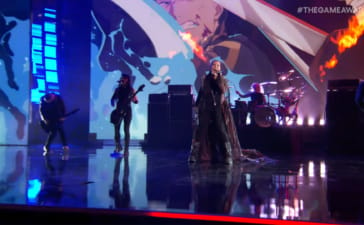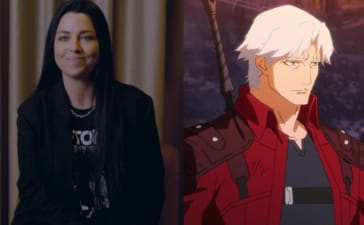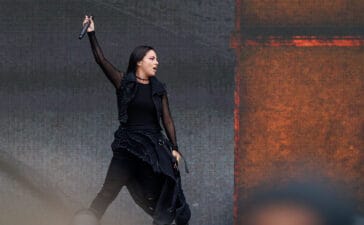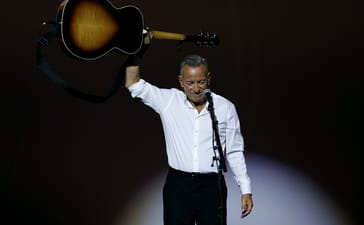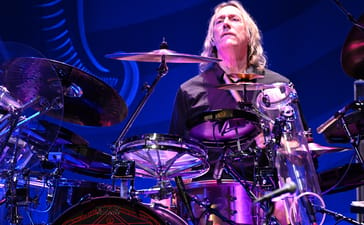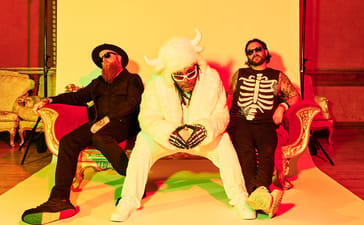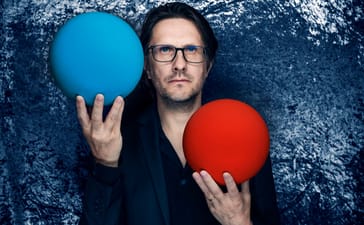Opening Up with… Evanescence
by David James Young
Opening Up sees us talk to musicians about the opening track from each of their studio albums. Our next guest is Amy Lee,lead vocalist and founding member of goth-pop veterans Evanescence. With millions of albums sold worldwide, the band are one of the most beloved of their era – and there’s still plenty left in the tank, as their latest studio album The Bitter Truth attests to.
Amy Lee’s eyes widen when she realises what the premise of today’s conversation is. “I never get asked about this sort of stuff!” she says excitedly from her Nashville home, surrounded by a stuffed toy collection belonging to her seven-year-old son Jack. Lee is very drawn to the prospect of a grand opening, whether that’s in the albums that she listens to, the gigs she attends or the movies she watches.
“I have a couple of different ideas about it,” she says. “An album opener… it’s got to pull you in. There’s different ways to do that, and we’ve done a few. One way is to give it the slow build – something that is opening up a world and an atmosphere to you where you’re like, ‘okay, this is the world I’m stepping into.’ It builds up until it gets to that first big moment of impact. The other method, which I also love, is when you don’t hesitate and just burst right into something. We do our live shows both ways, too. It’s one of those things where it just kind of depends on your mood. You want to really reflect not only where you’re at, but where you’ve been.”
“Going Under” – Fallen, 2003
In a different world, “Going Under” would have been the world’s introduction to Evanescence. The opening track to what would go on to be one of the highest-selling albums of the decade was the favourite among Lee and co. to be the lead-off single. Wind-Up Records, however, optioned “Bring Me to Life” – and the rest, as they say, is history. That’s not to count out “Going Under” by any means whatsoever – after all, as Buzz Aldrin once said, second comes right after first.
“That was the song that we really wanted,” says Lee, reflecting on the song nearly 18 years after its release. “I love ‘Bring Me to Life,” obviously, but we had a great feeling about ‘Going Under’ being sent to radio before the album came out. When that didn’t happen, it kind of became like, ‘Okay, well at least when you hear the album, I want it to still be the first thing that you hear.’”
The song details a tumultuous relationship Lee had in her early 20s, both in the throes of it and staring back at the ashes of its remnants. She acknowledges the song’s agency reflects both strength and vulnerability in tandem, which explains why it has spoken to so many listeners over the years. “I think it’s really strong,” she says.
“It presents a place that I kind of got to later. I’m calling out for help – ‘I’m going under/I’m drowning in you’ f – but it starts out with me being like, ‘You know what? I’m done with this. I’m stepping out of the situation.’ I think that attitude was something for me that I was more excited to project.”
Setlist.fm approximates that the band have played “Going Under” nearly 500 times over the years, making it one of the strongest staples of their shows. It’s a classic “hold out the mic” song – Lee can defer to her makeshift choir on any given night to take up any section of lyrics with full confidence they’ll be sung back loud and proud. “It’s a fun one to play live,” she says. “Some songs have more staying power than others, and that song really has that for me. That’s the song that still feels really good and still fits. It doesn’t have anything about it that sort of feels like ‘okay, that’s cool and that’s part of our history, but that’s not really what we are anymore.’ That one just really has stood the test of time.”
“Sweet Sacrifice” – The Open Door, 2006
The parallels between the first tracks on Evanescence’s first two records are obvious. Each cuts straight to the chase, pairing a distorted Lee vocal with a crunching, down-tuned palm-mute guitar chug before bringing in a steady full-band groove and a rousing, angsty chorus. Internally, however, the makeup of Evanescence had drastically shifted between albums – namely, the exit of the band’s co-founder in guitarist Ben Moody less than a year after Fallen‘s release. This came midway through a tour, leaving the band to scramble in finding a replacement guitarist – which came in the form of Terry Balsamo, who was in the opening band Cold. At the conclusion of the tour, Balsamo ultimately joined Evanescence full-time – a position he would hold for the next 12 years.
“That writing process was a new experience,” says Lee on co-writing with Balsamo for the first time. “We just had just a different energy, which was really cool. We spent lot of all-nighters in this house in LA – which was actually the first house I’d ever bought. Terry would come up and stay for a month or whatever at a time, and we would work all night.”
When queried specifically on the writing of “Sweet Sacrifice,” Lee recalls a moment where she and Balsamo really clicked creatively – the song’s stirring pre-chorus, which builds to its hard-hitting hook and big-swinging drums. “The guitar and the vocal are kind of mirroring each other there,” she says. “We were really excited about it. There was just this feeling that came with it – like, the freedom of saying ‘we’ve earned the right to make music however we want right now.’ So many people were breathing down my neck being like, ‘let me write your songs for you.’ Writing that song was us saying ‘no, we’re gonna do whatever we want because we earned this.’”
“I felt like the song was so beautifully heavy,” she continues. “I also felt like it would subvert what people would expect as an opening track. Because I was without my guitar-playing original counterpart, there was somehow this idea that the next record be softer and more feminine. I love heavy music, of course – and what was coming out of me and Terry was, in some ways, a lot heavier.”
September will mark The Open Door‘s 15-year anniversary, and although it doesn’t hold the same legacy as Fallen it remains a sentimental favourite among fans of the band. Lee still maintains a strong relationship with the record – if not for the fact that the band was able to make it at all in the first place.
“I still love it very much – it means a lot to me,” she says. “I did have a lot to prove, and I felt the pressure of people feeling like, ‘I wonder if she can do that without Ben.’ I was really excited to show right away that we were taking it to the next level.”
“What You Want” – Evanescence, 2011
The first thing you hear on Evanescence’s third studio album is not Lee. Hell, it’s not even a guitar. It’s a reverb-heavy kick and snare beat, which sounds like it’s echoing from the depths of an arena. It immediately kicks the album off on a high gear, and is a perfect example of Lee’s latter example of not hesitating and bursting right in as an opener.
“That’s Will,” she says of the song’s opening fill – courtesy of drummer Will Hunt, who made his debut on Evanescence after touring with the band for several years prior. “He is the greatest drummer in the world. That part was totally him – he is arena rock to the max, so it’s perfect. What’s cool about that is we all have different things in us that’s our own style, each member of band. When everybody’s particular tastes and styles get a chance to really shine through what they’re doing, I think that’s what can make it really amazing.”
“That album, it’s self-titled because it was such a group effort. Certainly it was more one than before, when it was really more kind of duos for both of the other albums – Ben and I, Terry and I. This time was more like, ‘okay, let’s let everybody really have a chance to shine.’” Lee points to “What You Want” in particular when reflecting on the all-in band approach in songwriting: “I believe it was me, Terry and Tim [McCord, bassist], and we were at my house in Brooklyn,” she says. “I had a little studio on the top floor, and just pulled up a loop on ProTools. Terry started playing, Tim started playing and it just became a thing with the three of us. We brought the band in, and that dinky little loop became what Will did. It really took it to another place.”
“It starts off with that awesome drum beat, but the combo to me really happens when when everything eventually comes in. It really comes together. I hear Terry in those different little half-note steps, I hear me bringing in some of my pop influences in the melody. This is us just really having fun making music and being ourselves.”
“Overture” – Synthesis, 2017
In one of the band’s most ambitious projects to date, Synthesis saw Evanescence team up with veteran composer David Campbell (AKA Beck’s dad) to create orchestral renditions of their best-known songs. Before it kicks off in earnest, however, the album opens with a swelling overture as penned by Lee herself. It’s a rare instance of her flexing a different creative muscle in the track-ones of the band’s career, where she is approaching it as an arranger and composer as opposed to a singer and songwriter.
“The whole idea of the project, for me, really stems from the fact that there’s all these little parts,” she says. “It’s where my classical influence, which was really my first really passionate musical influence, has a moment. It’s something that is an important core part of the music. ‘Never Go Back,’ which follows the overture, is one of those songs – the bridge is totally just like mad Mozart in the darkness, y’know? It’s my classical alter-ego going crazy. It’s interesting, because I think that the combination of that happening against the rock is really what makes it Evanescence. At the same time, I can still see this whole landscape of us that exists underneath and inside the music that is just entirely that other side. A lot of the time, when I’m coming up with the idea to start and then bring it to the table, it’s usually in this piano and electronics-based world before it really becomes a fully-fledged rock song. The idea of Synthesis was to get to just indulge in all of those things.”
When looking at the creation of the album’s overture, Lee sees that alter-ego taking both form and flight. “That part in particular is just one of my favourite moments on the record,” she says. “It’s very classically inspired, obviously. To make that into a full piece with David and give it that slow build, like we were talking about… I just loved being able to do that. That’s one of the ones that we’re driving you into a place and you’re like, ‘Oh, where are we going?’ And then you get there. It was very special to have at the beginning of every show on the tour – I’ll never forget that.”
“Artefact/The Turn” – The Bitter Truth, 2021
“Let me tell you about this, because it’s unusual.” Having eyed the conversation’s flow keenly, Lee is already prepared at the ready to talk about “Artefact/The Turn,” which opens The Bitter Truth – the first collection of all-new Evanescence music in a decade. As she will go on to explain in great detail, the album’s opening moment is twofold – hence the forward slash in its title. First, the artefact – which Lee found on her computer. “That’s nothing but like a little keyboard and my voice,” she explains.
“That part is me on my laptop with the laptop built-in mic in a hotel room in Canada in the middle of the night on tour. That was not intended to make it as is on the album. The reason it’s called ‘Artefact’ is something that Nick [Raskulinecz], our producer, said. He was like, ‘do you really want to redo this?’ I always was thinking I was going to – ‘Well, yeah,’ I said. ‘Don’t we need to like do it in high quality, like on a real microphone? He says, ‘I don’t know if you’re going to be able to recapture that exact feeling.’ I thought about that, and it all just kind of connected. It has all these little artefacts in it – it’s actually a little ancient piece of the the writing process, and it’s intact. It hasn’t been re-recorded or redone in any way.”
This leads to where the music makes a turn – courtesy, naturally, of ‘The Turn.’ This was another one-on-one between Lee and a collaborator – although this time, it arrives in the unexpected form of The Crystal Method’s Scott Kirkland. “We just met through a mutual friend, my old lighting director,” Lee explains. “We were both on the bill at some festival and we made friends. It turned out we were fans of each other, and I was like, ‘hey, if you ever want to just like swap files, who knows? We might come up with something!’ We started sending each other little baby demo ideas that we had. He had that music bed a little bit in a different arrangement that he sent to me – and again, on tour in a backroom, I found myself singing over it and came up with a melody. He tweaked it and did it for real, and that was it.”
Piecing these two compositions together made it very clear to Lee from the outset that this is how The Bitter Truth would begin – especially when she saw how it transitioned into track two, “Broken Pieces Shine”. “I love the way that that riff brings you into our band – where we are now and what the sound of us is now,” she says. “It’s driving, and it is coming for you – and it just feels so good when it hits. I love the beginning of this album.”
It’s been around a month since the album’s release, and although the band obviously haven’t gotten to play any shows thus far they’ve still been met with an endless stream of messages, comments and praise from fans all over the world. After such an extensive rollout – not by design, of course – the sense of relief within the Evanescence camp is palpable. “It’s so satisfying,” says Lee. “The one thing that’s going to drive it all the way home, obviously, is going to be when we get to live inside it and go on tour and play these songs live.”
“Even just with the release of it and getting to watch people’s reactions online, sharing it with our friends and family, to talk about it and have it all be out there… it feels really, really good. I put my whole whole self into it. To have it out there is great, but to have it be so well-received and see so much happiness from the fans about it? It feels, y’know…” Lee trails off for a second, before smirking at the first phrase that comes to mind. “It feels double good,” she laughs.




